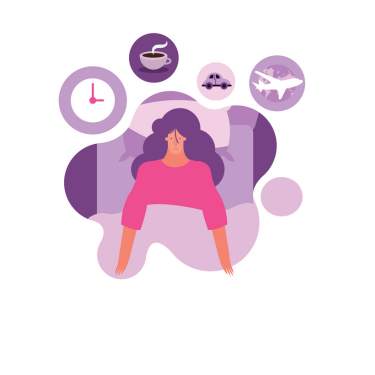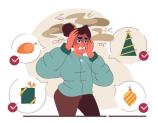Find Your Holiday Happiness: Manage Anxiety and Depression
Find Your Holiday Happiness: Manage Anxiety and Depression

Feeling Stressed Out? Would You Rather Be Out and About?
The holidays are an exciting time of good cheer, warm family traditions, and spending time with friends. Or, are they?
For many people, the idea of entering a crowded room and chatting up coworkers or strangers at a party, exchanging gifts with friends, traveling from home, or attending large family gatherings can produce intense anxiety, depression, or both.
Holiday parties are a common stressor, and they can be terrifying for people with anxiety disorders, particularly those who have social anxiety disorder. They may try anything to avoid such activities, but avoidance will only perpetuate fear. Although some report that the holidays lift their spirits, many people say that the holiday season makes them feel very or a bit more anxious or depressed.
How to De-Stress
You can reduce some of your holiday worry and stress. Try these tips:
- Take the pressure off yourself. If you set high expectations for yourself and for others at holiday events, you’re more likely to feel let down. Know that some things won’t go exactly as planned — and that’s just fine.
- Most people aren’t paying much attention to you. You may feel as if people are focusing on you, but in reality, most people are probably wondering what you are thinking of them. Try making a compliment, which can make others feel good, make you feel good, and reduce some stress.
- Identify your specific concerns. Are you afraid you will say the wrong thing or embarrass yourself? Remind yourself that although you may feel uncomfortable, maybe even very uncomfortable, that's the worst that can happen.
- Don’t look for relief in alcohol or drugs. Although it can be tempting to “take the edge off” at holiday events, alcohol and drugs can make anxiety worse and may trigger panic attacks.
- Smile, make eye contact, and ask questions. Most people like to talk about themselves and their interests. Ask other people about their holiday plans, what their kids are doing, or what book they’re reading. Avoid religion, politics, and other topics that can lead to heated discussions and add to your stress.
- Choose to say no. Try not to overschedule yourself during the holiday season. You don’t have to feel obligated to accept every invitation, and you may want to eliminate some traditions that cause you more stress than joy.
Overcome Your Travel Fears
Holiday travel can also trigger anxiety. People with panic disorder or agoraphobia may find overcrowded airports and train stations overwhelming. People with travel-related phobias who must use mass transit may anticipate their trips with dread, and those with generalized anxiety disorder may find a host of new things to worry about while traveling, further interfering with their daily lives.
It's important to remember that avoidance will not help overcome an anxiety problem, and it may even stir up other undesirable feelings or consequences, such as being the only family member absent from Christmas dinner.
Instead of dreading travel, consider it a chance to practice facing your fears. Try these tips, too:
- Plan and confirm all details. To decrease your stress level, try to book flights that leave early in the day, when airports tend to be less crowded. Always confirm flight, hotel, and car rental reservations, and allow ample time to pack so you can organize your belongings and bring everything you need, including IDs for security checkpoints and your medications.
- Think ahead. Make a list of activities you will engage in while traveling. Prepare for potential anxiety-inducing situations by practicing stress-reducing techniques such as slow, deep breathing, meditation, and progressive muscle relaxation.
- Put anxiety-reducing techniques to work. If you have a fear of flying, tell the gate agent or flight attendant when you check in and board. Ask if you can meet the pilot and copilot. Ask them a personal question, such as “Do you have a family?” Seeing that the people flying the plane are “real people” can be comforting. If you are claustrophobic, you may want to request an aisle seat so you can get up and move around should you feel the need.
Help Your Anxious Children
For some children the holidays evoke fear and anxiety. Here are some ideas for reducing children’s holiday anxiety:
- Plan ahead. Talk to your child about what makes her anxious during this time of year and come up with ways to minimize that anxiety. Teach her how to initiate a handshake if hugging is unwelcome. Practice ways to say thank you for unwanted gifts or deep-breathing techniques for when you child feels overwhelmed.
- Eliminate the unexpected. Tell your child who will be attending an event. If your family will have to travel, explain how you’ll get there.
- Create a secret signal that you and your child can use to let you know he needs your help without alerting others in the room.
- Schedule special family time. Try to find time for your family to play a board game, watch a favorite holiday video, make cookies, or engage in other fun and relaxing activities at home.
- Take care of yourself. Your child will pick up on your stress. So try to make sure the entire family eats balanced meals, drinks enough water, exercises, and keeps stressful holiday shopping and other events to a minimum.




















